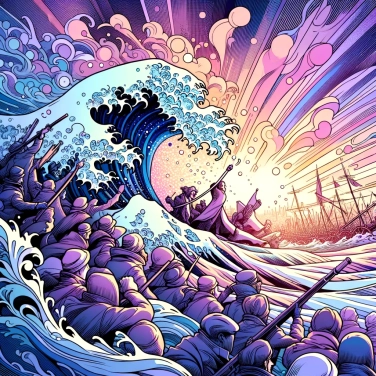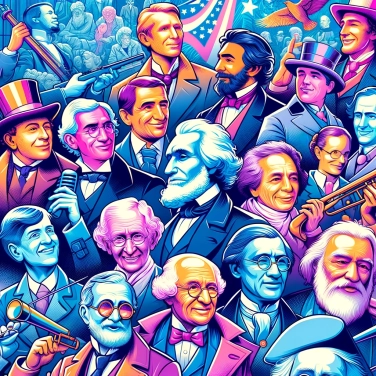Leon Trotsky was assassinated during Stalin's Great Purge due to his political opposition and rivalry with Stalin for power within the Soviet Communist Party.

Between Trotsky and Stalin, right after Lenin's death in 1924, things heat up considerably. Trotsky advocates for a permanent revolution, firmly believing that communism must rapidly expand beyond Soviet borders to survive. In contrast, Stalin prefers his idea of "socialism in one country", solidly establishing communism in the USSR before aiming elsewhere. It may seem technical, but essentially, it was a clash of ideas on how to lead the country and manage the communist revolution on a global scale. This deep disagreement will create two opposing camps within the communist party, increasing tensions and making any peaceful coexistence between the two men clearly impossible.
Leon Trotsky was far from being a mere opponent: he represented a very serious ideological rival to Stalin, with significant influence among communist militants. Renowned as a brilliant speaker and influential author, he embodied the revolutionary wing of the party with his theory of permanent revolution, a direct contrast to the concept of socialism in one country advocated by Stalin. His historical prestige linked to his role in the Russian Revolution of 1917, particularly his leadership in the creation of the Red Army, further enhanced his popularity. Even in exile, Trotsky maintained the ability to mobilize international opinion and disseminate his ideas, posing a significant threat to the authority and stability of the Stalinist regime. For Stalin, this clearly represented a concrete political danger that needed to be eliminated swiftly.
Once sidelined from power by Stalin, Trotsky found himself forced into exile starting in 1929. He first went to Turkey, then moved on to France, Norway, and finally Mexico. It was from abroad that he continued to tenaciously denounce the Stalinist regime, openly criticizing it in writings and public speeches. He even established an opposition organization, the Fourth International, in complete rupture with Stalin's policies. Thanks to his way with words and his international popularity, Trotsky then posed a real political danger to the regime in Moscow. His distant activism was so disruptive that Stalin ultimately decided to eliminate him by sending an agent to assassinate him in Mexico in August 1940.
During the 1930s, Stalin implemented a methodical plan to eliminate any form of internal opposition. This period, known as the Great Terror, witnessed mass arrests, rigged trials, and summary executions. The goal is clear: to establish Stalin's absolute power by removing anyone suspected of being a potential threat. No one is safe: members of the Communist Party, military personnel, intellectuals—anyone who does not strictly adhere to the Stalinist line risks being targeted. Leon Trotsky, even in exile in Mexico, remains a top priority for Stalin. Eliminating Trotsky means definitively removing one of the strongest symbols of viable opposition to the regime.
Although the Great Purge mainly affected Soviet territory, Trotsky was assassinated abroad because Stalin feared that his international influence could become an alternative to Stalinist communism.
Before his assassination, Trotsky had already survived several assassination attempts orchestrated by Soviet authorities, including an armed attack on his residence in Mexico in May 1940.
After his death, the house where Trotsky lived in Mexico became a museum dedicated to his life, his work, and the history of communism. The museum still exists today under the name 'Museo Casa de León Trotsky'.
Trotsky was expelled from the Soviet Union in 1929, and following his exile, he wrote several critical works against the Soviet regime, notably 'The Revolution Betrayed,' a text denouncing Stalinism as a betrayal of the original revolutionary ideals of 1917.
The death of Trotsky significantly weakened his supporters and strengthened Stalin’s grip on the international communist movement. However, it also crystallized anti-Stalinist opposition within certain Marxist circles, creating a lasting division between the supporters of Stalinism and those of Trotskyism.
The Great Purge was a massive political repression campaign led by Joseph Stalin in the 1930s, aimed at eliminating any potential opposition in the USSR. It included show trials, executions, imprisonments, and deportations to the gulags.
After losing the power struggle against Stalin, Trotsky was expelled from the Communist Party, exiled from the USSR, and then forced to flee through several countries before finally settling in Mexico due to the political persecutions orchestrated by Stalin.
The assassination of Trotsky was meticulously organized by the USSR under Stalin's orders. An undercover Soviet agent, Ramón Mercader, acting under a false identity, dealt the fatal blow to Trotsky in Mexico with an ice axe on August 20, 1940.
Trotsky represented an ideology different from that of Stalin, particularly concerning permanent revolution and Marxist internationalism. His popularity and influence posed a direct threat to Stalin's political dominance.

No one has answered this quiz yet, be the first!' :-)
Question 1/5